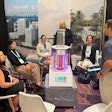For some events, your clients are going to want a speaker. Sometimes they have a particular person in mind and other times they have no idea. No matter which situation you find yourself in, finding and booking a speaker doesn't have to be stressful, with some background knowledge and tips from the experts.
The first thing you need to decide is whether you want to use a speakers bureau. You may be able to make the contacts on your own to get the speaker you want, but a speakers bureau can take a lot of the planning and worry out of your hands. These organizations are free of charge to you as a planner and will help you find the right speaker for your event, help with logistics regarding the speaker's schedule and travel arrangements, and act as a liaison between you and the speaker. It's the bureau's job to know all the details about speakers, how they operate, and their strengths and weaknesses.
"We really are part of [the planner's] team—our job is to make their speaker selection process as seamless and painless as possible," says Diane Goodman, president of the Goodman Speakers Bureau in Windsor, Connecticut. And while the price of booking your speaker could be higher if booked through a bureau, this is not always the case.
Whether or not you choose to use a speakers bureau, there are a few things you should know about the process of selecting and booking a speaker to make your task a little easier.Before contacting a bureau or speaker, know the complete details of your event. This includes the size, culture, and demographics of the audience, the length of time the speaker will be expected to speak, the room set-up, and the scope of the event.
"The first thing they have to do is get their executives on board and really have some intense dialogue about why they are bringing in an outside speaker," Goodman says. "The more they can share with us about the organization and their culture, the better we can identify who will fit and be the best speaker for their event."
Have realistic expectations about the cost of the speaker and know your budget. Be prepared to budget enough money that you have options when it comes to speaker selection. There are speakers for all budget levels, but more high-profile speakers will require a higher fee.
It's important to note that many well-known and experienced speakers will not lower their rates. In some cases, offering a donation to a charitable organization the speaker supports could reduce their rate, in addition to being a tax deduction for you. If you are going to ask for a reduced rate, you should do a few things beforehand.
According to Larry Baltz, managing partner at Great Keynote Speakers of Nashville, Tennessee, speakers may be willing to reduce their rates if any of the following apply:
• A valuable audience will be present.
• The speaker will have space in the room for back-of-the-room sales, a prime source of revenue.
• The event schedule is flexible, and you can work around the speaker's schedule.
• You can offer the speaker a favorable travel schedule or an airport-friendly location.
• You offer to refer the speaker to some of your associates in the industry, a great way for the speaker to book future gigs.
If none of the above sways your potential speaker into reducing his or her rate, ask what it would take for them to do so. There may be something you haven't considered.
Another way to potentially reduce the cost of a speaker is to find one near your event, thus minimizing or eliminating travel and accommodation expenses.
If you're working with a bureau, you can also ask for speakers that will be in your area around the time of your event—again, travel costs are largely negated if the speaker is already in town for another event. The speaker may also consider a more favorable rate.
Once you have a clear budget in order, you can start the search for your speaker. If you're working with a bureau, they will be able to give you a list of potential speakers based on your needs and budget. If you are working on your own to find a speaker, having these details clear in the beginning will make generating a list much easier.
During the process, take time to look at each speaker's Web site and request any printed material they may have available for review. In addition, look at videos of him or her in action to determine if his or her demeanor, method of presentation, and material are a good fit for your event. Doing so helps you get a clear picture of what they are offering and what they could bring to your event or meeting.
Next comes the phone interview. This is the only time you will have to talk to your potential speakers before making a selection, so ask lots of questions. One of the biggest mistakes that planners make, according to Goodman, is not asking the right questions.
Let the speaker know up front how long the interview will be, a little bit about your organization, and what you are looking for in a presentation. This allows them to assess accurately if they have the right background and knowledge to be a success at your event. As much as you want a speaker to be a good fit for your event, they want to ensure they are hitting their target audience, too.
"The outcome we all want is to have a successful meeting," says Goodman. "We don't want a mismatch."
At the end of the interview, ask for four or five former clients the speaker has worked with to get references.
Now comes the pivotal step: making the final decision. Speakers' schedules can fill up quickly—especially if they are high-profile personalities—so make your decision as soon as possible. The last thing you want is to decide on a speaker and find out he or she is already booked for the day of your event.
In general, you want to contact a speaker six to eight months in advance. The sooner you get a speaker nailed down, the sooner you or the bureau can finalize all the travel, transportation, and accommodation details.
One of the biggest pitfalls you want to avoid is a lack of communication. Once you have gone through the process of evaluating a speaker and booking a speaker it may seem like you're finished.
However, it is crucial—both for the success of your event and your own peace of mind—that the speaker be fully aware of the time line of the event and all that is expected of him or her.
What time are they to arrive? What are they expected to speak about and for how long? Do they need to leave time for a question-and-answer session? These are just some of the questions the speaker should have answers to; and the answers should be clearly stated in their contract with you.
Also, if the speaker will be attending any pre- or post-performance events, they need to know the details up front. If you give a speaker enough notice ahead of time, many will attend socials or brunches with your V.I.P.s, executives, and sponsors.
Steven Blank, chairman of Accent Speaker's Bureau at the University of Florida, advises you to go over all the details with your speaker again once they arrive at the event.
"Communication is key for everyone the whole way through," agrees Goodman. "The planners need to stay in touch with their executives or client and with the bureau; and we stay in touch with the planner and speaker."
Booking a Celebrity
Before signing the contract to book a celebrity, know what amenities they require before or during the event. Many celebrities have special requests that may require extra money from your budget. Be aware of these extra expenses up front, before you are committed to that speaker.
Find out how many people are in their entourage and if you are responsible for accommodations and transportation for them.
If you are booking a musician or comedian, ensure that you know their sound, staging, and lighting requirements. These costs can add up quickly and make a significant dent in your budget.
Many celebrities have busy schedules that fill up quickly. Therefore, you must give them even more notice than non celebrity speakers. Nine months to a year in advance is preferable.
The first thing you need to decide is whether you want to use a speakers bureau. You may be able to make the contacts on your own to get the speaker you want, but a speakers bureau can take a lot of the planning and worry out of your hands. These organizations are free of charge to you as a planner and will help you find the right speaker for your event, help with logistics regarding the speaker's schedule and travel arrangements, and act as a liaison between you and the speaker. It's the bureau's job to know all the details about speakers, how they operate, and their strengths and weaknesses.
"We really are part of [the planner's] team—our job is to make their speaker selection process as seamless and painless as possible," says Diane Goodman, president of the Goodman Speakers Bureau in Windsor, Connecticut. And while the price of booking your speaker could be higher if booked through a bureau, this is not always the case.
Whether or not you choose to use a speakers bureau, there are a few things you should know about the process of selecting and booking a speaker to make your task a little easier.Before contacting a bureau or speaker, know the complete details of your event. This includes the size, culture, and demographics of the audience, the length of time the speaker will be expected to speak, the room set-up, and the scope of the event.
"The first thing they have to do is get their executives on board and really have some intense dialogue about why they are bringing in an outside speaker," Goodman says. "The more they can share with us about the organization and their culture, the better we can identify who will fit and be the best speaker for their event."
Have realistic expectations about the cost of the speaker and know your budget. Be prepared to budget enough money that you have options when it comes to speaker selection. There are speakers for all budget levels, but more high-profile speakers will require a higher fee.
It's important to note that many well-known and experienced speakers will not lower their rates. In some cases, offering a donation to a charitable organization the speaker supports could reduce their rate, in addition to being a tax deduction for you. If you are going to ask for a reduced rate, you should do a few things beforehand.
According to Larry Baltz, managing partner at Great Keynote Speakers of Nashville, Tennessee, speakers may be willing to reduce their rates if any of the following apply:
• A valuable audience will be present.
• The speaker will have space in the room for back-of-the-room sales, a prime source of revenue.
• The event schedule is flexible, and you can work around the speaker's schedule.
• You can offer the speaker a favorable travel schedule or an airport-friendly location.
• You offer to refer the speaker to some of your associates in the industry, a great way for the speaker to book future gigs.
If none of the above sways your potential speaker into reducing his or her rate, ask what it would take for them to do so. There may be something you haven't considered.
Another way to potentially reduce the cost of a speaker is to find one near your event, thus minimizing or eliminating travel and accommodation expenses.
If you're working with a bureau, you can also ask for speakers that will be in your area around the time of your event—again, travel costs are largely negated if the speaker is already in town for another event. The speaker may also consider a more favorable rate.
Once you have a clear budget in order, you can start the search for your speaker. If you're working with a bureau, they will be able to give you a list of potential speakers based on your needs and budget. If you are working on your own to find a speaker, having these details clear in the beginning will make generating a list much easier.
During the process, take time to look at each speaker's Web site and request any printed material they may have available for review. In addition, look at videos of him or her in action to determine if his or her demeanor, method of presentation, and material are a good fit for your event. Doing so helps you get a clear picture of what they are offering and what they could bring to your event or meeting.
Next comes the phone interview. This is the only time you will have to talk to your potential speakers before making a selection, so ask lots of questions. One of the biggest mistakes that planners make, according to Goodman, is not asking the right questions.
Let the speaker know up front how long the interview will be, a little bit about your organization, and what you are looking for in a presentation. This allows them to assess accurately if they have the right background and knowledge to be a success at your event. As much as you want a speaker to be a good fit for your event, they want to ensure they are hitting their target audience, too.
"The outcome we all want is to have a successful meeting," says Goodman. "We don't want a mismatch."
At the end of the interview, ask for four or five former clients the speaker has worked with to get references.
Now comes the pivotal step: making the final decision. Speakers' schedules can fill up quickly—especially if they are high-profile personalities—so make your decision as soon as possible. The last thing you want is to decide on a speaker and find out he or she is already booked for the day of your event.
In general, you want to contact a speaker six to eight months in advance. The sooner you get a speaker nailed down, the sooner you or the bureau can finalize all the travel, transportation, and accommodation details.
One of the biggest pitfalls you want to avoid is a lack of communication. Once you have gone through the process of evaluating a speaker and booking a speaker it may seem like you're finished.
However, it is crucial—both for the success of your event and your own peace of mind—that the speaker be fully aware of the time line of the event and all that is expected of him or her.
What time are they to arrive? What are they expected to speak about and for how long? Do they need to leave time for a question-and-answer session? These are just some of the questions the speaker should have answers to; and the answers should be clearly stated in their contract with you.
Also, if the speaker will be attending any pre- or post-performance events, they need to know the details up front. If you give a speaker enough notice ahead of time, many will attend socials or brunches with your V.I.P.s, executives, and sponsors.
Steven Blank, chairman of Accent Speaker's Bureau at the University of Florida, advises you to go over all the details with your speaker again once they arrive at the event.
"Communication is key for everyone the whole way through," agrees Goodman. "The planners need to stay in touch with their executives or client and with the bureau; and we stay in touch with the planner and speaker."
Booking a Celebrity
Before signing the contract to book a celebrity, know what amenities they require before or during the event. Many celebrities have special requests that may require extra money from your budget. Be aware of these extra expenses up front, before you are committed to that speaker.
Find out how many people are in their entourage and if you are responsible for accommodations and transportation for them.
If you are booking a musician or comedian, ensure that you know their sound, staging, and lighting requirements. These costs can add up quickly and make a significant dent in your budget.
Many celebrities have busy schedules that fill up quickly. Therefore, you must give them even more notice than non celebrity speakers. Nine months to a year in advance is preferable.



















